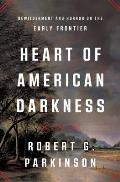Donis Review of Parkinson’s Heart of American Darkness
H-Early America just ran Jay Donis’s review of Robert G. Parkinson’s new book, Heart of American Darkness: Bewilderment and Horror on the Early Frontier.
Donis writes:
While we can productively discuss the nuances, at a basic level the value of distinguishing “settler colonialism” is easy to understand. The concept addresses an issue I’d puzzled over back in high school: a “colonial subject” in the context of the American struggle for independence is quite different from a “colonial subject” in the context of the Indian struggle for independence.
Donis writes:
the Yellow Creek Massacre of April 30, 1774, and Logan’s Lament, once saturated the minds of the American public and “had become fixtures in early American culture” (p. 328). Millions of copies of educational books, such as Caleb Bingham’s American Preceptor (1811) and William McGuffey’s Eclectic Readers (1836/37) revealed the story to new generations of Americans well into the twentieth century. And yet, a search for “Yellow Creek” and “Logan’s Lament” in the flagship journals of early American history reveals few results, with the exception of a Robert Parkinson article in a 2006 issue of the William and Mary Quarterly.[1]A significant portion of the review concerns how to define and understand “settler colonialism.” That’s a relatively recent historiographical term, coined by Patrick Wolfe in the 1990s. I remember being puzzled by how authors seemed to expect readers to be familiar with the phrase when I’d never seen it before, so I was reassured to find it postdated my college years.
In short, Parkinson’s latest book restores the spotlight to an incident that once played a pivotal role in shaping how many Americans understood the nation’s history. How Parkinson restores this event, through the inclusion of Native actors and Native voices, is important as well. Based around the incident at Yellow Creek, the book examines the historical links and paths of the Cresap and Shickellamy families from the 1730s to the early twentieth century, focusing primarily on the mid to late eighteenth century. . . .
During the massacre, a party of white men murdered several members of Shickellamy’s family and other Natives, leading Soyechtowa, one of Shickellamy’s sons, to craft the speech that became known as Logan’s Lament. Part 3 examines the changing depictions of Michael Cresap and Logan’s Lament in national memory from the Revolutionary War through the twentieth century.
Although it may seem odd for a book to focus on the Cresap family, a family not present at the Yellow Creek Massacre, Parkinson explains why this choice is necessary. Most early Americans, including Soyechtowa, mistakenly believed that Michael Cresap orchestrated the murder of Native Americans at Yellow Creek. To be sure, Cresap did not like Native peoples and he threatened to kill, if not actually killed, Natives in April 1774 on the Ohio River, but he was miles away from Yellow Creek on the fateful day of the massacre. As a result of this confusion, the Cresap and Shickellamy families became linked in the minds of many Americans for generations. Parkinson masterfully untangles this link throughout the book.
While we can productively discuss the nuances, at a basic level the value of distinguishing “settler colonialism” is easy to understand. The concept addresses an issue I’d puzzled over back in high school: a “colonial subject” in the context of the American struggle for independence is quite different from a “colonial subject” in the context of the Indian struggle for independence.


1 comment:
Words like empire and colonialism are so instantly compelling, it takes time to step back and double-check yourself. I had "imperialism" in my (19th c hist) PhD dissertation for months before I suddenly realized this week that I needed to define empire and explain why it's a useful concept. Thank you for the link!
Post a Comment